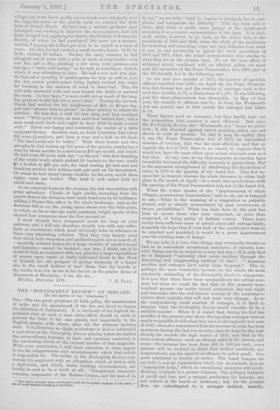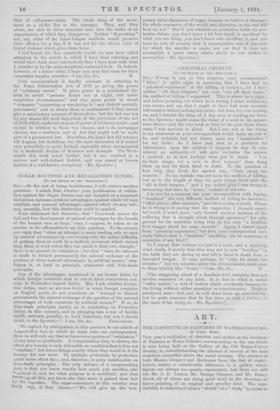THE "FORTNIGHTLY REVIEW" ON IRELAND. (TO THE EDITOR OP THE
" SPECTATOR.") SIE,—The two great questions of Irish policy, the maintenance of order and the amendment of the law, are about to engage the attention of Parliament. It is obviously of the highest im- portance that at such a time every effort should be made to present the facts of the case plainly and impartially to the English people, with whom, after all, the ultimate decision rests. It is, therefore, no slight misfortune to find. so influential a periodical as the Fortnightly Review placing before its readers the extraordinary travesty of facts and opinions contained in the concluding article of the current number of that magazine. With your permission, I will draw attention to what appear to me the exaggerations and misstatements which that article is responsible for. The writer in the Fortnightly Review com- mences his argument with au allegation which at best is only a half-truth, and which, under existing circumstances, can hardly be said to be a truth at all. "Exceptional measures, ,coercion, suspension of the Habeas Corpus, and the rest of it,
* The whole country when surveyed is laid out in square sections of 640 acres,— six of such sections forming a townland,
do not," we are told, " tend to remove or diminish, but to com- plicate and exasperate the difficulty." This has been said so often, that there is really some danger of the uninformed accepting it as a correct representation of the facts. It is obvi- ously unfair, however, to go back, as the writer does, to the precedents of 1833 and 1848, when the whole of the machinery for detecting and punishing crime was very different from what it now is, aud practically to ignore the truer precedents of 1870 and 1871, when the police arrangements were similar to what they are at the present time. To see the true effect of arbitrary arrest, combined with an efficient police, we must note the operation of the Peace Preservation Act, 1870, and of the Westmeath Act in the following year.
In the first four months of 1870, the number of agrarian offences reported was 1,161; on April 4th, the Peace Preserva- tion Act became law, and the number of outrages sank in the next four months to 91, a diminution of 1,070. In the following year the same phenomenon was observable. In May of that year, the number of offences was 75; in June, the Westmeath Act was passed, and in that month the outrages had fallen to 14.
These figures need no comment, but they hardly bear out the proposition that coercion is never effectual. But, says the Fortnightly Review, the " Westmeath Act" forms no prece- dent; it was directed. against secret societies, which are not shown to exist at present. To this it may be replied that it was the Peace Preservation Act of 1870, an undoubted measure of coercion, that was the most effective ; and, that as regards the Act of 1871, there is no reason to suppose that it would not have the same effect upon actual criminals now as it had then. At any rate, to say that measures of coercion have invariably increased the difficulty is merely to ignore facts. Nor is the argument strengthened by attributing the diminution of crime in 1870 to the passing of the Laud Act. That Act be- came law in August, whereas the whole decrease in crime took place in the month of April,—in a word, was synchronous with the passing of the Peace Preservation Act, not of the Land Act. When the writer speaks of the "imprisonment of whole villages, promiscuous incarceration," and RO on, one is tempted to ask,—What is the meaning of a suggestion so palpably absurd, and so utterly unwarranted by past occurrences or future probabilities ? What has been done in the past has been to arrest those who were suspected, or more than suspected, of being guilty of definite crimes. There have surely been sufficient cases of actual crime and outrage lately, to justify the hope that if even half of the malefactors were to be arrested and punished, it would be a great improvement over the existing state of things.
We are told, it is true, that things may eventually become so bad as to necessitate exceptional measures ; at present, how- ever, things are by no means in a very bad way,—it is only that we in England "naturally view every incident through the disturbing and exaggerating medium of fear." "Agrarian murders and outrages have never been frequent." This is, perhaps, the most wonderful, because, on the whole, the most absolutely misleading of the Fortnightly Review's arguments.
It is true that there have been comparatively few actual mur- ders, hut when wo recall the fact that at this moment some hundred persona are under armed protection day and night and remember also the well-known anxiety of the assassins to survive their exploits, this will not seem very strange. As to the comparatively small number of outrages, it is hard to imagine what the Fortnightly Review would consider to be a suitable number. When it is stated that during the first ten months of the present year alone, the agrarian outrages were as nearly as possible double what they were in the typically bad year of 1847; when it is remembered that the increase of crime has been enormous during the last two mouths, that the total for the year
already far exceeds the high record of 1870, 'and that in the more serious offences—such as offences agliniit the person, and arson—the increase has been from 400 to 500 per cent., some
persons will be inclined to think that neither positively nor
comparatively can the number of offences be called. small. One more argument is worthy of notice. The Land League, we are told, is not an organisation which can be reached; it is au "impalpable body," which no exceptional measures will touch. Nothing, I believe, is a greater delusion. The ordinary instincts of profit and loss, and a natural preference for honesty, are not extinct in the hearts of Irishmen ; but for the present they are subordinated to a stronger instinct, namely, that of self-preservation. The whole sting of the move- ment as a strike lies in the outrages. They, and they alone, are able to drive reluctant men into the ranks of an organisation of which they disapprove. Neither "Boycotting" nor any other of the Land-League methods would preserve their efficacy for a day, if it was not for the rati»za ratio of brutal violence which gives them force.
I had hoped, Sir, that somebody would ere now have called attention to the article to which I have been referring, and would have dealt more conclusively than I have done with what I consider to be the misconceptions contained in it. In default, however, of a better critic, I hope you xnay find room for these somewhat lengthy remarks.—I am, Sir, &c., H.
Our correspondent is hardly accurate in referring to the Peace Preservation Act of 1870 as giving the power of "arbitrary arrest." It gives power in a proclaimed dis- trict to arrest "persons found out at night, and under suspicious circumstances," and also gives power to arrest "strangers "sojourning or wandering in " any district specially proclaimed," ancl to detain them in confinement if they cannot give a satisfactory account of themselves; but the last was not by any means the most important of the provisions of the Act of1870 which conferred no general power of arbitrary arrest ; and except in relation to these two clauses, and to its newspaper clauses, was a moderate sort of Act that might well be made part of a permanent law. Doubtless, the Land Act did not pass till August, but doubtless, too, the mere discussion of it tended very powerfully to quiet Ireland, especially when accompanied by a moderate display of firmness and strength. The West- meath Act went much further, but it was confined to a narrow and well-defined district, and was aimed at known leaders of a well-known conspiracy.--En. Spectator.]















































 Previous page
Previous page